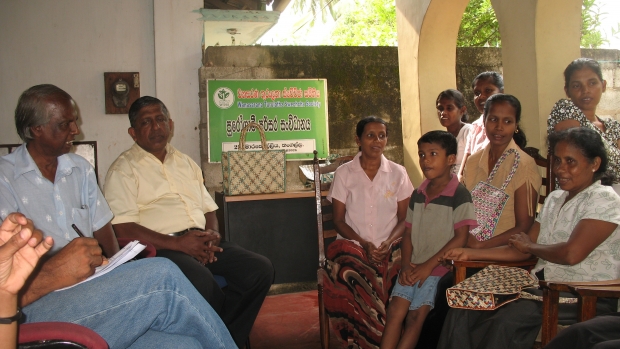Grants :: Small Grant Facilities :: Enhancing the incomes of fisher families through handicraft production
Enhancing the incomes of fisher families through handicraft production

Handicraft-livelihood , Sri Lanka © RMahindapala , 2009
Objectives
This project had three main objectives:
- to enhance the knowledge of the community about mangrove protection and management;
- to bring timber cutting in Medilla lagoon under control; and
- to improve the livelihoods of 50 women living close to the lagoon.
Background
Danketiya, Palathuduwa and Netolpitiya are three coastal villages in south-east Sri Lanka that were hit by the 2004 Indian Ocean tsunami. Thanks to the mangroves and other coastal vegetation that protect the area, the tsunami did not cause severe damage, though it did affect the local fishing industry and fishing incomes. The continued protection and management of these forests are vital, but local authorities apparently have done little to ensure this happens.
The threat to the mangroves stems from the villages situated close to Medilla lagoon, whose inhabitants harvest the mangrove trees and other plants for firewood and timber poles. As a result, the populations of Rhizophora mucronata and Bruguiera gymnorrhiza trees in these forests are declining. This project sought to reverse this trend by educating villagers about the importance of the mangroves, and by empowering women economically through income-generating alternatives to fishing. To test one alternative, Wanasarana Thurulatha Volunteer Society, a CBO from Matara, began a training programme in handicraft production using locally abundant Pandanus kaida leaves.
Target beneficiaries
Fifty women from five villages.
Outputs
- Delivery by a qualified instructor of five training programmes on processing Pandanus leaves, dyeing techniques, bag design, bag making, and marketing techniques.
- Provision for each trainee of a monthly supply of Pandanus leaves, dye, cloth, thread, cardboard and gum for the first nine months of their venture.
- Planting of 6,000 P. kaida plants in selected areas of Medilla beach in Netolpitiya village.
Accomplishments and challenges
As a result of the project, 50 women were gainfully self-employed on a part-time basis in producing handicrafts. The women produced a range of items, including mats, satchels, vegetable and fruit bags, ladies’ handbags, clutch bags and coin purses. The project also introduced weaving of reed bags. Production time varied for each item, ranging from three to seven days.
Each women earned between US$25 and US$45 from selling bags, increasing the average income of their households by around 60%. The women were able to earn this income while still carrying out their household responsibilities, as they could operate from home and choose their hours of work themselves.
The Pandanus planted on Medilla beach as a source of leaves for producing handicrafts grew well and will contribute to coastal protection.
Challenges
One challenge was that the models and designs of bags change rapidly along with fashion trends, and it was sometimes difficult for the women to keep pace with these changes. Dry weather and browsing by stray cattle also affected the growth of the Pandanus plants.
Contributions to cross-cutting themes
Gender equality
Fifty women from five villages were empowered economically by the extra income they earned under this project.
Lessons Learned
Community awareness is the key to success for projects of this nature. Also essential is to develop market linkages before implementing such projects, and to adopt a clear, realistic implementation schedule and stick to it.
Women in the community now have part-time jobs which do not depend on anyone else. They have organised small savings societies in which each member deposits 5% of her monthly earnings into a common bank account. This money is used to buy raw materials.
Project Facts
Country
Location
Rekawa, Ussangoda and Kalametiya (RUK) area, Sri Lanka
Topic
Duration
1st Jan 2009 to 31st Dec 2009
MFF Grant Amount
US$4,342
Implementing Partner
Wanasarana Thurulatha Volunteer Society
Weeraketiya Road, Danketiya,
Tangalle, Sri Lanka
Tel: +94 47 2242628
“Thanks to handicraft production, the income of the women in 50 beneficiary families living in the coastal areas of Rekawa and Medilla increased by about 60%. They are aware of the importance of coastal ecosystems in the area and no longer cut mangroves for fuelwood.”
— MR H. P. PIYATISSA
PROJECT MANAGER
